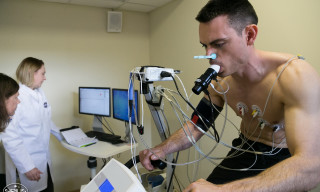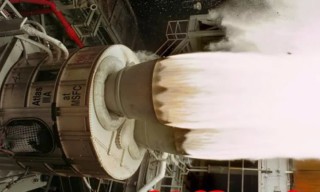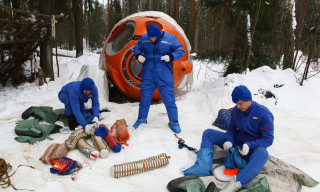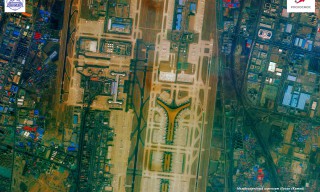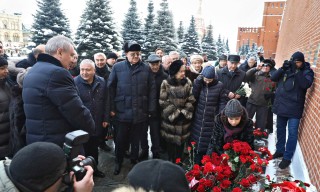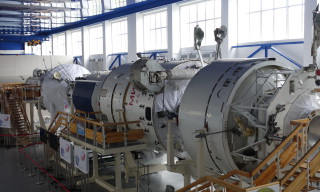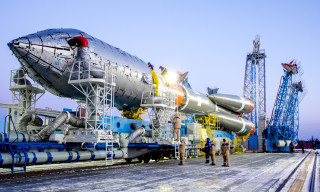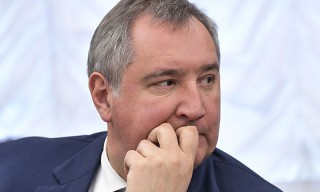-
This error message is only visible to WordPress admins
Error: API requests are being delayed. New posts will not be retrieved.
There may be an issue with the Instagram access token that you are using. Your server might also be unable to connect to Instagram at this time.
Error: API requests are being delayed for this account. New posts will not be retrieved.
There may be an issue with the Instagram access token that you are using. Your server might also be unable to connect to Instagram at this time.
Categories
- Angara (43)
- Astronomy (9)
- Baikonur Cosmodrome (520)
- Brazil (1)
- China (4)
- CrewDragon (4)
- Defenсe (47)
- ESA (119)
- Falcon (2)
- Featured article (12)
- GCTC (222)
- Guiana Space Centre (17)
- History (59)
- India (1)
- ISS (550)
- JAXA (49)
- Johnson Space Center (3)
- Khrunichev State Research and Production Space Center (63)
- Mars (8)
- MCC (85)
- Moon (21)
- NASA (206)
- Plesetsk Cosmodrome (84)
- Progress (233)
- Proton (137)
- Roscosmos (645)
- ROSS (4)
- RSC Energia (94)
- Russia (755)
- Satellites (232)
- Science (137)
- Soyuz (550)
- Space (472)
- Spacewalk (72)
- SpaceX (6)
- Star city (67)
- Starliner (7)
- Tourism (27)
- USA (72)
- USSR (1)
- Vostochny Cosmodrome (69)
- Zero Gravity (12)
Category : Russia
February 12, 2019
Petr Levochkin, chief designer of NPO "Energomash, designer and manufacturer of the famous "RD-180" family of engines, commented on the PR statement of Elon Musk about the “superiority” of "Raptor" engine, created by SpaceX: “The SpaceX company creates the "Raptor" engine on oxygen and methane components or, as is customary in the Russian classification, the gas-gas scheme. In such schemes, such a pressure level in the combustion chamber is not something extraordinary - in our designs for these schemes we lay down the pressure level in the chamber over 300 atmospheres. However, Mr. Musk, not being a technical specialist, does not take into account that the "RD-180" engine for the Atlas launch vehicle uses a completely different fuel circuit - “oxygen-kerosene”, and these are another parameters of the engine operation. It is like comparing a diesel and a gasoline internal combustion engine. Despite the fact, that our companies are competitors, we as engineers welcome the first successes of colleagues from SpaceX in the field of rocket engine building. Indeed, during the development of the Raptor engine, American engineers reached a record pressure level in the chamber. This indicates a fairly high level of development and production processes at SpaceX. ”
full storyFebruary 6, 2019
After passing the theoretical exams, the ISS crew started practical tests on simulators. The commander of the "Soyuz MS" spacecraft Alexey Ovchinin successfully passed the exam on a specialized simulator "Teleoperator", the purpose of which is to work out the modes of manual telecontrol of the approach and docking from the ISS of the transport cargo ship"Progress MS". And today, the ISS crew members-Roscosmos cosmonaut Alexey Ovchinin and NASA astronaut Nick Hague passed the exam on the "Don-Soyuz" specialized simulator, where one of the main elements of the crew's practical training for the flight takes place.
full storyJanuary 31, 2019
he Institute for Biomedical Problems of the Russian Academy of Sciences continues preparations for the SIRIUS-19 international isolation experiment. IRIUS-19 simulates the flight of a crew of six people to the Moon, followed by circling and searching for a landing site, landing four crew members for surface operations, staying in the Moon’s orbit to receive transport ships and remotely controlling the lunar rover to prepare the base and then returning to Earth.
full storyJanuary 30, 2019
On January 28, the RD-180 rocket engine was successfully tested in the Scientific Testing Complex of NPO "Energomash" JSC. The liquid-propellant rocket engine RD-180 was developed and produced by NPO "Energomash". The engine designed for use in the US "Atlas" family of launch vehicles.
full storyJanuary 22, 2019
The training of cosmonauts and astronauts on the actions after landing in a wooded area in winter starts in Star City. The task is to spend two days in the forest in conditions, close to those, in which the crew of the "Voskhod-2" ship (Alexei Leonov and Pavel Belyaev) were in March 1965 In total, this time in the GCTC will be "winter survival" of seven crews. The training is conducted by the GCTC test and training team, which consists of instructors, doctors, psychologists and other specialists.
full storyJanuary 15, 2019
On January 14, 2019, Russian remote sensing satellites "Kanopus-B" №5 and №6, launched into orbit on the eve of the new 2019 year, transferred the first images of the Earth. Spacecrafts "Kanopus-B" №5 and №6 joined the successfully functioning space group. So, now in space is operating a full orbital system for operative monitoring of the technogenic and natural emergency situations of the six "Kanopus-B" spacecrafts. For more than six years of operation, the space complex "Kanopus-B" with the same devices demonstrated its high reliability and relevance, becoming suppliers of high-quality satellite images.
full storyJanuary 11, 2019
On January 11th 2019 in Moscow at the Red Square held a ceremony of laying flowers at the burial place of the founder of Russian practical cosmonautics Sergey Korolev, related to his 112th birthday anniversary. Director of the “Roscosmos” State corporation Dmitri Rogozin, Sergey Korolev daughter - Natalia Koroleva, Soviet and Russian cosmonauts, executives and representatives of the space industry enterprises took part in the ceremony. Sergey Korolev considered as a pioneer in the main directions of developing national rocket weaponry and the space-rocket industry (rockets R-2, R-5, R-7, first satellite in the world PS-1, spaceship “Voskhod” and oth.), providing strategic parity and made Russia the leading space-rocket country.
full storyJanuary 11, 2019
On January 11, 2019, Gagarin Cosmonaut Training Centre celebrates 59th anniversary.
full storyDecember 24, 2018
On December 24, 2018, the "Soyuz-2.1a" launch vehicle (LV) was removed from the technical to the launch complex of the "Vostochny" cosmodrome and installed on the launch system. The launch of the "Soyuz-2.1a" launch vehicle with Russian satellites for remote sensing of the earth and monitoring of emergency situations "Kanopus-B" № 5 and 6 is scheduled for December 27, 2018. This will be the fourth launch from the new Russian cosmodrome.
full storyDecember 12, 2018
Russia Wants to Extend U.S. Space Partnership. Or It Could Turn to China. Russia’s Museum of Cosmonautics displays with rightful pride artifacts from its early years of storied achievements in space exploration: the first satellite, the first dog in space, the first man and, soon thereafter, the first toolbox. On Tuesday evening in Moscow, two Russian cosmonauts, Sergey Prokopyev and Oleg Kononenko, exited the station for a spacewalk to investigate the exterior of the capsule. They planned to remove a panel from the craft and return it to Earth for an examination for signs of leaked sealant. The Soviet Union, though beaten to the moon by the United States, was no slouch in lunar exploration. The Soviet Union was the first to photograph the far side of the moon and to land a rover and return a sample robotically. But it canceled its piloted program in the 1970s rather than strive for a second-place landing. “We were close,” Mr. Moiseyev said. Separate programs today, Mr. Rogozin said, are a fallback option. “It wouldn’t be right,” he said, to plan for a future of piloted flight after the International Space Station with multiple, competing national programs or alliances. What Russia can offer, Mr. Rogozin said, is a margin of safety for any future moon orbiting station. Over decades operating the Salyut and later Mir space stations, Russian cosmonauts tackled a range of in-flight emergencies and repairs ranging from fires to collisions that made the Russian program look like an orbiting Murphy’s Law. But they survived. “It’s better, cheaper and safer to go together,” Mr. Rogozin said. “Politicians will say, ‘Let’s do it alone,’ but politics ends where the opinion of a serious scientist begins. That’s what I say.” If the United States chooses to exclude Russia, and an emergency arises, he said, “Who will answer for that?”
full storyPages :






